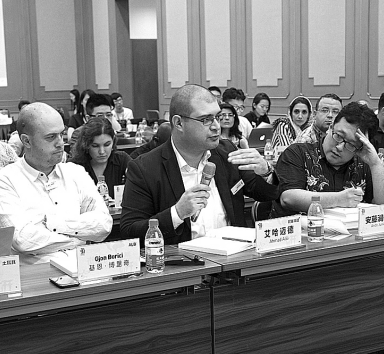Program hosts 120 young Sinologists this year
 |
|
Scholars interact in the Visiting Program for Young Sinologists in Beijing. [Photo provided to China Daily] |
Ana Jovanovic learned about China from books she read in high school in the 1990s in Serbia. During one summer break back then, she found the novel Imperial Woman by the celebrated late author Pearl S. Buck.
Jovanovic was fascinated by the novel on China's last empress, Cixi, for its depiction of the ancient country.
After reading the book, Jovanovic looked for other works about China and later chose Chinese as her major subject in college.
Eventually, she came to know about Chinese writers such as Lu Xun, Lao She and Ba Jin.
"It's interesting that I was drawn to China studies by reading an American author (Buck) first," Jovanovic, 41, says in Beijing.
The lecturer of Chinese at the University of Belgrade is among 120 scholars who are in China now as part of the Visiting Program for Young Sinologists, an annual project launched by the Ministry of Culture and the Chinese Academy of Social Sciences in 2014.
The program's Beijing session this year has 27 foreign participants whose studies cover Chinese arts, language, history and politics, among other fields.
"The program aims to give young Sinologists an opportunity to know more about China," says Zhu Qi, deputy director of the international liaison department of the Ministry of Culture.
Over Sept 11-13, young Sinologists listened to lectures by prominent Chinese scholars, such as historian Ge Jianxiong and international relations expert Jin Canrong, and discussed many topics with them. The visiting scholars will be conducting shortterm individual studies at different research institutions, including the National Library of China, Chinese National Academy of Arts and Beijing Language and Culture University.
From Sunday to Wednesday, they will go on a field trip to rural parts of Jiangxi province to study traditional Chinese culture and folklore.
Meanwhile, Shanghai is hosting similar seminars through Saturday and Xi'an in Shaanxi province through Tuesday.
A group of scholars on the program have also visited Zhengzhou in Henan province.
This year's program began in July and ends on Sept 30.
"When we started the program, there were only 30 participants, and it was only in Beijing," says Zhu, adding that in future the program might be expanded and a fund launched to sponsor China-related projects by foreign scholars.
"It's my first time in Beijing, and I am thankful for this opportunity," says Gjon Borici, who studies international relations in Albania.
His book Albanian-Chinese Relations During the Cold War was published in 2016.
"I just donated one copy to the National Library of China," Borici adds.









